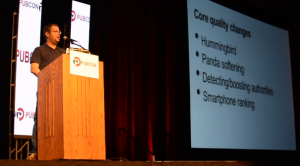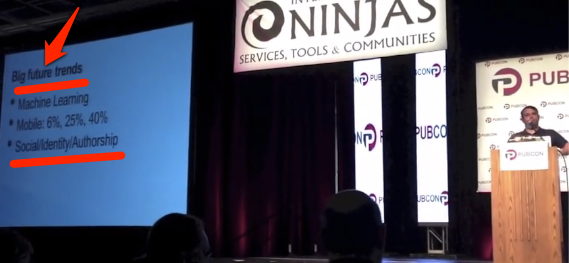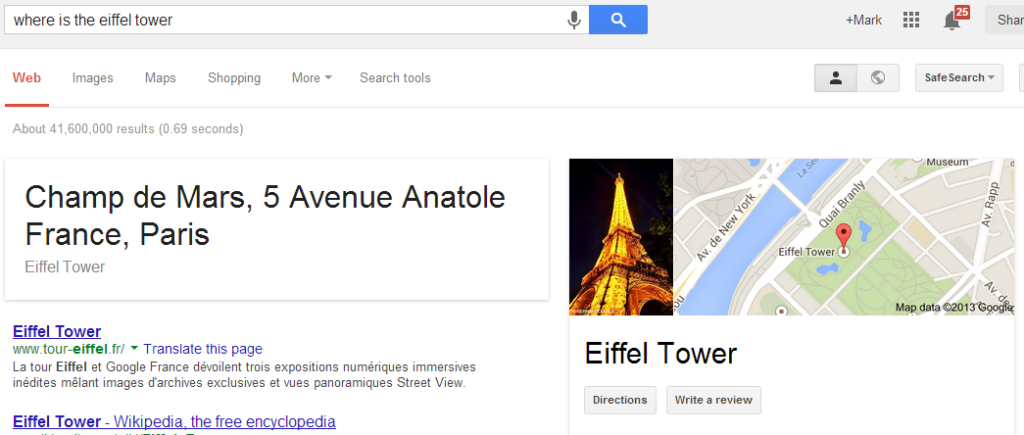 After reading several live blog notes (here and even better here) on the keynote address by Google’s Matt Cutts at Pubcon 2013 yesterday, I was seeing intriguing hints that he had spoken about some topics near and dear to me.
After reading several live blog notes (here and even better here) on the keynote address by Google’s Matt Cutts at Pubcon 2013 yesterday, I was seeing intriguing hints that he had spoken about some topics near and dear to me.
But since these were live notes, some of the details were a bit fuzzy. I really wanted to hear what Cutts actually said.
So I was grateful to find a video someone had posted of the first 20 minutes of his keynote: Thanks to Andy Akers on Twitter, heres a complete video of Matt’s keynote and the following Q&A:
Much of Matt’s talk was about the things Google is actively working on now and will be pursuing in the future. In this post I’m going to pull out a few highlights and comment on them, mostly centering around the topics of Authorship and authority.
Boosting Subject Authorities
[Tweet this section!]Back in July of this year I wrote about Google Subject Authority Ranking. That post was in reference to a video by Cutts in which he spoke about Google “getting better” at identifying sites that are seen as authorities in a given subject, and then giving those sites a boost in the rankings.
Now at Pubcon (9:04 in the video), Cutts reinforced that they “want to be able to push you up a little bit higher” for queries related to a subject in which you are seen as an authority. Once again, he was sparse on details as to exactly how Google is evaluating and determining “authority,” but he did mention that there are “thousands of different topic areas” on which sites are being evaluated.
The problem here is that he remained ambiguous about whether he was referring to site authority, author authority, or both. At first I thought he had definitely said “site” in the video, but upon a closer listen this appears to have been (possibly) a slip of the tongue. He says, “If you’re an authority in a medical site…the medical space…” So it’s really hard to tell if he’s restricting this, for now, to just sites, or if it’s open to individuals as well. Throughout the rest of that section, he just uses the pronouns “you” or “your” so there are no further clues.
Even back in the earlier video I cited above, Matt never specifically himself limits what he’s saying to sites. At the time, I took it that he was referring to sites because the user question to which he was responding was about site authority. But anyone who listens regularly to Cutts knows he doesn’t always restrict himself to answering the question asked.
So does this mean that Google has begun to implement some form of Author Rank? I remain skeptical that it has. For one thing, in the past month we’ve had two prominent Google spokespersons state unequivocally that Google is not yet using Authorship data in search results.
For another thing, no one has been able to produce credible evidence that their Authorship in and of itself has led to their content getting higher rankings for a subject area. Frankly, I don’t even know how you would test for that. We don’t even know what the subject areas that Google would use are, nor how granular they are. And I don’t see any way you could isolate the effects of your Authorship from all the other signals, known and unknown, that could be affecting your rankings.
And Matt’s verb choice is interesting. Even though this was in a section about current “core quality changes” in Google search, he conspicuously does not say that they are pushing up authorities in the SERPs, but rather that they “want to be able to.” That leaves enough ambiguity that I don’t think we can call this a slam dunk pronouncement that Author Rank (or any kind of subject authority) is currently live in Google SERPs, except maybe in some preliminary and experimental ways.
Authorship and Spam. Later in the talk, starting at 17:31, Matt again brings up Authorship and identity. This time he’s talking in the context of fighting web spam. He remarks “if [the Google] webspam [team] knew who people were, it would be much easier to keep the spammers out of search results.”
Notice two things there: One, he doesn’t mention ranking here at all; just eliminating spam. Two, he again uses non-present language. It would be easier to eliminate spam, not it is now easier because of Authorship. Furthermore, he made these remarks in a section of his talk headed “Big future trends” (see the screen capture below from another video of the speech that included his slides).

So my opinion (and it’s just that) is that Google is implementing subject authority boosting first on a sitewide basis , and author subject boosting is still in the works, but even site subject authority might still be in the future. Don’t you love how clear Matt makes things?
While at Pubcon Matt said “there’s nothing you have to do” to become one of these subject authorities, he suggested that if you are a topical authority, you should “keep writing about it, keep developing, keep deepening the amount of content you have.” As we’re hearing with the Google Hummingbird update, high quality content that specifically addresses the information needs of searchers is more important than ever.
On that topic, Eric Enge of Stone Temple Consulting has published an excellent article on the reasons you must become an expert.
If Google Can Serve the Query Better than You, They Will
[Tweet this section!]Shocker: Google does not exist to promote your brand or site.
Actually, that shouldn’t come as a shock to anyone who has been carefully observing what Google has been up to in recent years. In the Pubcon address, Matt Cutts stated it very clearly: Google’s mission is to organize the world’s information. Period. And he added, very tellingly, “the words ‘search engine’ do not appear in our mission statement.”
In other words, up until now, and for the time being, organizing the world’s information via an algorithm-driven search engine was the most efficient and scalable way for Google to fulfill its mission. But with the advent of things like the Knowledge Graph and Google Now, we are seeing the beginning of Google serving up information directly on its site, without the need for the user to click through to another web site. Add to that Google’s experiments with shopping results, hotel and flight reservations, and it begins to creep into businesses’ wallets.

This is the hard, cold truth that too many site owners don’t want to face. There is no longer any value in serving up generic or commodity information. With Hummingbird and semantic search, Google is getting better at using machine learning to understand the world’s knowledge base. The main reason for Google Search to exist, from Google’s point of view, is for people to be exposed to AdWords ads, the source of most of Google’s income. So what matters most to Google is that searchers are happy with the results they get, so they will come back to Google again and again. And if searchers can get the information they seek without an extra click, well, that’s just more happiness.
So should we site owners and marketers just give up? No! This just means that if you want to continue to get organic traffic from search, you’ve got to be creating resources that are so unique, so helpful, so valuable, that it continues to be easier and better for Google to send searchers to your site, rather than giving them a quick and dirty answer on Google.
Yep, excellent, useful content. Once again.
Social Signals are For the Long Haul
[Tweet this section!]Another interesting tidbit from Cutts’s speech actually provided information I don’t think we’ve heard before about social signals. I suspect this part of his address was motivated by things like the blowup over the much-misunderstood Moz study on search ranking factors, which showed a strong correlation between Google+ +1’s and high-ranking sites. After a number of bloggers started claiming that Moz was saying that +1’s could cause higher search rankings, Matt had to step in at Hacker News to categorically state that no, +1’s are not a direct ranking signal for Google search.
So what good are so-called “social signals”? In a very intriguing segment of his address, Matt told us that social signals such as Facebook Likes, Twitter retweets, and Google +1’s don’t do anything for you in the short term. In other words, just getting any of those isn’t going to immediately affect your ability to rank in search.
But…he said that over the long haul, a long history of accumulating positive social signals “can show a search engine that you should be trusted,” and perhaps eventually contribute to you or your site getting pushed up in search. So along with authoritative content, having a strong network of “fans” who like and promote you and your content is important, but it’s a long-term play, not a short-term ranking scheme.
UPDATE: In the Q&A, Eric Enge mentioned that when Matt talks about Google+ social signals and search, he always speaks of +1’s specifically. Eric asked if there was any differentiation in that regard between +1’s and other Google signals, such as a share. Matt said that there is not, that he merely uses +1 as a convenient shorthand for any sort of signals from Google+, and that neither +1’s nor shares nor comments at present have any direct effect on search rankings. But, he said, all of those are a part of the “long haul” effect he spoke about previously. They all may help to build your authority over time.
Fewer Authorship (and Other Rich Snippet) Results in Search
[Tweet this section!] Another brand new revelation in the keynote by Matt Cutts was that Google will be cutting back on the number of Google Authorship and other rich snippet search results shown in search. Basically, they are going to tighten up the qualifications for earning such a result, but without telling us what those qualifications will be, other than the oft-repeated “be a trusted authority.”
Another brand new revelation in the keynote by Matt Cutts was that Google will be cutting back on the number of Google Authorship and other rich snippet search results shown in search. Basically, they are going to tighten up the qualifications for earning such a result, but without telling us what those qualifications will be, other than the oft-repeated “be a trusted authority.”
Cutts mentioned that their testing showed that a 10-15% reduction in the number of Authorship results shown greatly increased the quality of those results for searchers. That they have been doing such testing may explain why we’ve heard from an increasing number of members in the Google Authorship and Author Rank Community that their Authorship results had disappeared from Search.
I warned that this was coming in my post about the recent official Google Authorship FAQ where Google stated that linking one’s Authorship to low quality, non-original content, or to pages that really aren’t article-level content (such as product pages or a home page) might cause one’s photo to stop showing in search. Now Matt Cutts has confirmed that they are going to put teeth behind that warning.
So…same song and dance as above: create expert level content in your main topical areas, and build strong social networks of people who love and share it.
There was a lot more in Matt’s talk, of course, but these were the items that leapt out at me. What do you think?
Tweet comment about this post:
@marktraphagen great observations. Good to see others write about what I have been saying!
— Alan Bleiweiss (@AlanBleiweiss) October 27, 2013
Check out our Google Plus Page Guide







Social Signals are really going to be counted as one of the biggest factors in the coming days. Matt Cutts though never reveal everything at once, but with this one can clearly say that gaining authority in a niche is the only way to success.
Mark this is like the dozens of suggestions you have made to all of us to focus on the quality of your unique content and build your authorship through quality content – it works. Do it. There is no other way anymore. Confirmation again that these ideas are on the right track. May we all do this and be the ones that post with authorship snippets. Thanks for sharing your Pubcon info with us.
Great summary Mark! I can already hear you know who telling everyone author rank is now live because of Matt’s speech!
He must be taking a nap today because normally he’d be on this almost before I posted it 😉
Content still remains king. But Google is it’s Emporor. I would still make sure to keep working on alternative methods for getting traffic.
I think still there is some importance of social signals in short run also. I make few post and only shared by readers on social media got good ranking and traffic
Aprajita, you can “think” that but it doesn’t make it so. Did you run carefully controlled tests ensuring that you were isolating so that only the social signals were involved? Doesn’t sound like it. A multitude of things can cause a page to rank well, especially for long tail keywords.
I’m inclined to believe Matt on this one because it doesn’t make sense for a search engine as spam sensitive as Google to give weight to a signal which is SO easily gamed.
I can think of a few real estate websites that are running mostly listing pages starting with the home page. They probably shouldn’t have authorship in search results. It will be interesting to see if Google makes good on their intent to remove it from these types of websites and pages.
I’m betting that it’s only a matter of time. I’m already hearing from people who were doing similar things who have seen their Author photos disappear from SERPs.
I wonder how Google ranks itself in terms of authority and relevance compared to owner websites when displaying search results.
That’s a good question, Jeff. I think in some cases Google has to be throttling itself or they would overwhelm the SERPs to a point of absurdity.
Google+ is a good example. Because Google+ profiles have PageRank, in the early days it was ridiculously easy for power users to get public G+ posts ranking in Search. In fact, there were many complaints that some queries were getting taken over by G+ posts. That doesn’t happen any more. You can still get good rankings with the occasional G+ post, but nowhere near as easily as before. So what changed? Google must have throttled back on the authority that G+ profiles could gain.
Even though I love and promote Google Authorship, I have to agree with my colleague Russ Jones that Google Authorship is one of the biggest incentivized linkbuilding schemes ever launched. Google “pays” you with your pretty face in the SERPs in exchange for sprinkling links back to Google+ (via your Authorship linkage from your content) from all over th web.
“Search, and you will find” I think serving up information directly by google was the next logycal step, however great content is still king and even greater content will be emperor! Great article, thank you.
Looking forward to discussing this with you tonight in the HOA Mark. The statements about authorship results is a pretty big indicator of what Google is messing with right now. They are tweaking the recipe to provide us with the best results. Isn’t that what they are always doing? Reducing authorship results in SERPs tells me that the initial algo signals to recognize and rank authorship posts needed adjusting. Ok.. I;m sure it will get adjusted again.. and again…
The info about content authorities (regardless of site, author, or both) tells me the goal has not changed. Create the best search experience possible for their advertising platform.
I keep hearing the same message in the background though… “stop trying to understand and just do it.” The rules are pretty simple, the results verifiable and measurable. Stop trying to figure it out and just use it.
Well said, John.As we said in the Hangout last night, Google’s principles for Webmasters haven’t really changed much over the years. What has changed is Google’s ability to actually put some muscle behind those guidelines.
Sounds like there are no short cuts anymore. From my own personal experience in the last several month it appears they’re looking for authentic signs of authority, measured by links from other high authority domains with varied anchor text, something that can’t be gamed.
Social Signals are really going to be counted as one of the biggest factors in the coming days… Thanks for sharing this great piece of information Mark…